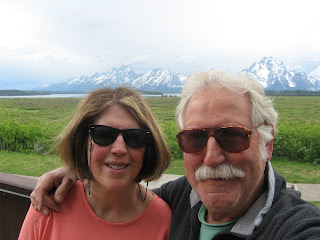
The weather gods just aren't favoring us. Cars heading south this morning were covered with snow and we've learned Yellowstone, our destination tomorrow, is closed to traffic. We've grabbed the brief bouts of sun when we could, but the clouds are dark and heavy and when it hasn't rained the past couple days it's hailed. The temperatures were in the 80s the week before we left.
Hiking's been out, but we've seen our share of bison, elk and antelope from the car, along with a couple distant moose. We've met lots of fellow nature lovers and this trip it seems all of the Europeans (who flock to this area) are, oddly, Dutch. We talked with one who'd shipped his camper over from Antwerp and would be exploring the US for a year. The only place he and his wife had been that disappointed was California. "We didn't like the people," he said, while we hoped to convince him otherwise.
For her part, our server at the lodge, where we snacked on truffle fries and Snake River Ale before being chased inside by a storm, said the Dutch tourists were the worst: "They only tip 3%!" she grumbled. Another Dutch couple rented a camper in Canada and would head up to Alaska in another month or so to "see the glaciers before they melt" due to global warming. "There's nothing like this in Europe," they said, sharing their binoculars with a young American couple. "All these animals..." It often seems to us that those from other countries have a greater appreciation for, and knowledge of, the great American outdoors than many citizens do.
Bear Facts
(If you're not a fan of Animal Planet or Discovery, you may want to tune out.)
Although grizzlies have remained elusive this trip, a friend emailed that they'd found a black bear on their kitchen counter in Tahoe, eating apples! We've learned a lot about the iconic grizzly. Three of its key food sources in this area are threatened. Cutthroat trout, which inhabit the shallow streams, are being eaten by introduced lake trout, which live in deep waters inaccessible to bears. The army cutworm moth which sips nectar and rests on high-altitude rocks provides bears with important fat in the fall, but it's a crop pest and is being decimated by pesticides in the plains states. And pinenuts (who knew?), another important food, are in ever-shortening supply thanks to the pine bark beetle killing pine trees.
This is why the Willow Flats elk calving area is closed to people -- as much to allow the bears undisturbed access to an important protein source as to protect humans. It's gruesome for the elks, but they greatly outnumber grizzlies at an estimated population of 8,000 to the grizzlies' 300, and the elk are fed by humans in the winter, while bears eat nothing for months.
Cubs are born only if the sow has had enough food prior to hibernation, and they're only 10 ounces at birth. Emerging from the den in May, they'll remain with their mother all summer long, gaining about 50 pounds and returning to the den with her in November. They continue to nurse through a second winter, as well as a third, when they've reached 80 pounds. Pity the poor mother grizzly, who feeds the cubs for two and a half years, a year longer than the common black bear. With low reproduction rates, poaching by humans and threatened food sources, the grizzly's future is uncertain.
With luck, we'll see this charismatic critter and wolves, if we can get into Yellowstone.
For an assortment of random photos, either copy and paste or click on:
http://picasaweb.google.com/happytwo.mcwilliams/2Teton?authkey=Gv1sRgCN-HwdOsq-23IQ&feat=directlink

No comments:
Post a Comment